 There’s mutterings of some discontent around MySpace, the insanely popular social site.
There’s mutterings of some discontent around MySpace, the insanely popular social site.
Billy Bragg, well known in the UK for his rebel-rousing tunes, has taken a stance against MySpace by removing his music in protest of MySpace’s Terms and Conditions.
Bragg and ‘his people’ posted a comment on their MySpace blog (we do love it when a companies tools are used against them), decrying what they say are completely unreasonable terms.
TERMS: (as of 17th March 2006)
By displaying or publishing (“posting”) any Content, messages, text, files, images, photos, video, sounds, profiles, works of authorship, or any other materials (collectively, “Content”) on or through the Services, you hereby grant to MySpace.com, a non-exclusive, fully- paid and royalty-free, worldwide license (with the right to sublicense through unlimited levels of sublicensees) to use, copy, modify, adapt, translate, publicly perform, publicly display, store, reproduce, transmit, and distribute such Content on and through the Services. This license will terminate at the time you remove such Content from the Services. Notwithstanding the foregoing, a back-up or residual copy of the Content posted by you may remain on the MySpace.com servers after you have removed the Content from the Services, and MySpace.com retains the rights to those copies.
The summary? MySpace can exploit the music/content that is put on the site, worldwide, without payment – and sub-license it infinitely.
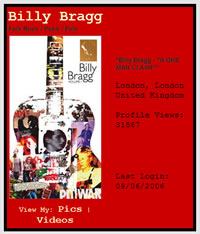 The original Bragg posting was made back in mid-may, but was highlighted when it was picked up by the New York Daily News this week.
The original Bragg posting was made back in mid-may, but was highlighted when it was picked up by the New York Daily News this week.
Since then, there have been many announcing the impending death of MySpace with thoughts that all musicians would follow suit and MySpace would implode. As yet we haven’t seen any signs of this.
It appears that MySpace didn’t intend to own everything and are putting it down to sloppy lawyering and say they intend to straighten things out. MySpace spokesman Jeff Berman, told the New York Daily News, “Because the legalese has caused some confusion, we are at work revising it to make it very clear that MySpace is not seeking a license to do anything with an artist’s work other than allow it to be shared in the manner the artist intends,” adding the all important. “Obviously, we don’t own their music or do anything with it that they don’t want.”
There’s a difficult balance to be had here. Clearly MySpace is putting out millions of musicians tracks daily and needs to be able to do this, without having a separate contract with each artist. Running alongside this need is the equally important need not to terrify the musicians into thinking that all of their music are belong to us (MySpace).
 There’s been some deep rumblings of discontent from tens of thousands of customers trying to sign up to Carphone Warehouse’s offer of “free” broadband.
There’s been some deep rumblings of discontent from tens of thousands of customers trying to sign up to Carphone Warehouse’s offer of “free” broadband.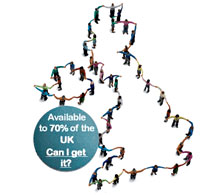 The TalkTalk offer gives punters unlimited landline telephone calls and broadband access for £20 per month, with a one-off £29.99 connection fee.
The TalkTalk offer gives punters unlimited landline telephone calls and broadband access for £20 per month, with a one-off £29.99 connection fee. The Independent has reported that chatrooms have been “inundated” with punters venting their frustration over their attempts to sign up to the service, with the TalkTalk website offering a rueful apology on their website:
The Independent has reported that chatrooms have been “inundated” with punters venting their frustration over their attempts to sign up to the service, with the TalkTalk website offering a rueful apology on their website: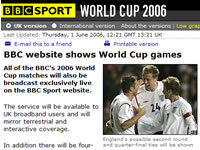 The BBC Sport Website will be carrying all of the World Cup 2006 football matches – Live. It will be only open to UK broadband users (or non-UK clever clogs who can set up a proxy or two).
The BBC Sport Website will be carrying all of the World Cup 2006 football matches – Live. It will be only open to UK broadband users (or non-UK clever clogs who can set up a proxy or two). Panic in the network departments of companies around the UK will be settling in tomorrow morning as they realise quite how many of the employees will be sneaking a watch of the matches while at work. We suspect that bosses will be sanctioning, or possibly even buying TV for the staff to watch, rather than have their networks melt around them.
Panic in the network departments of companies around the UK will be settling in tomorrow morning as they realise quite how many of the employees will be sneaking a watch of the matches while at work. We suspect that bosses will be sanctioning, or possibly even buying TV for the staff to watch, rather than have their networks melt around them.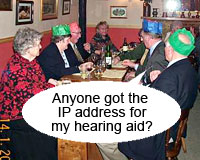 Crumblies all across the UK are being given the chance to try out the new fangled interwebby thing thanks to Age Concern’s ‘Silver Surfer Week.’
Crumblies all across the UK are being given the chance to try out the new fangled interwebby thing thanks to Age Concern’s ‘Silver Surfer Week.’ Silver Surfer Clubs
Silver Surfer Clubs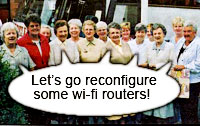 Frankie’s story
Frankie’s story “Before I began the courses, I’d never even switched a computer on,” says Frank. “I’m now planning to create my own Website that my family and friends can visit to see my latest photographs and exchange messages. It’s a great way to share experiences and keep in touch.”
“Before I began the courses, I’d never even switched a computer on,” says Frank. “I’m now planning to create my own Website that my family and friends can visit to see my latest photographs and exchange messages. It’s a great way to share experiences and keep in touch.” There were a lot of infrastructure companies trying to sell WiFi or WiMAX systems, some in the consumer space, but mainly for service providers. Of the mobile networks, only T-Mobile had a big stand, Orange had a small “business” services stand and O2 had a section of the Cloud’s stand.
There were a lot of infrastructure companies trying to sell WiFi or WiMAX systems, some in the consumer space, but mainly for service providers. Of the mobile networks, only T-Mobile had a big stand, Orange had a small “business” services stand and O2 had a section of the Cloud’s stand.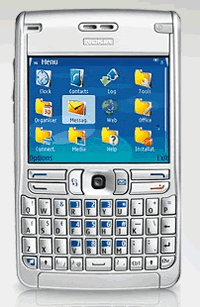 USR aka (US Robotics) have announced a USB handset that works with Skype. It’s really just a USB sound-device, but looks like a phone and has Skype integration (i.e. you can pull your contacts etc from Skype and they show in the phone’s display). They’ve also got a USB Skype conferencing device so several people sitting around a table can listen and speak on the call. Their ADSL/ADSL2+/Wireless routers are all now very simple to configure with wireless security turned on by default and basic ISP settings pre-configured.
USR aka (US Robotics) have announced a USB handset that works with Skype. It’s really just a USB sound-device, but looks like a phone and has Skype integration (i.e. you can pull your contacts etc from Skype and they show in the phone’s display). They’ve also got a USB Skype conferencing device so several people sitting around a table can listen and speak on the call. Their ADSL/ADSL2+/Wireless routers are all now very simple to configure with wireless security turned on by default and basic ISP settings pre-configured. The Cloud were there with a HUGE O2 Exec (aka i-mate JASJAR), anyone using the Exec can log-in to the Cloud’s homepage through WiFi, hit the O2 logo, enter their mobile number and the user will be phoned back. If they enter the digit 1 they’ll be granted access (and billed to that number).
The Cloud were there with a HUGE O2 Exec (aka i-mate JASJAR), anyone using the Exec can log-in to the Cloud’s homepage through WiFi, hit the O2 logo, enter their mobile number and the user will be phoned back. If they enter the digit 1 they’ll be granted access (and billed to that number). Zyxel had a their normal range of wired/wireless and security products. The star of their stand was their keyfob wireless hotspot locator. It works with all modes of WiFi (i.e. 802.11a/b/g) and supports unsecured and secure networks (WEP, WPA etc) showing what networks are available (at least 9 were available around the Zyxel stand).
Zyxel had a their normal range of wired/wireless and security products. The star of their stand was their keyfob wireless hotspot locator. It works with all modes of WiFi (i.e. 802.11a/b/g) and supports unsecured and secure networks (WEP, WPA etc) showing what networks are available (at least 9 were available around the Zyxel stand).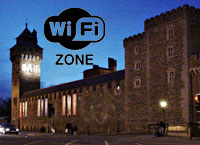 BT has today announced its plans to set up wide-area Wi-Fi networks in 12 cities, giving perambulating folks access to high-speed Internet and telecoms services.
BT has today announced its plans to set up wide-area Wi-Fi networks in 12 cities, giving perambulating folks access to high-speed Internet and telecoms services. Lovely, lovely Cardiff was the city chosen for the first roll out of the Wireless City scheme, with BT Openzone hotspots being installed in many locations in the city centre.
Lovely, lovely Cardiff was the city chosen for the first roll out of the Wireless City scheme, with BT Openzone hotspots being installed in many locations in the city centre. BT is also looking to use the service to promote a Wi-Fi version of its BT Fusion mobile phone services which will be launched later this year.
BT is also looking to use the service to promote a Wi-Fi version of its BT Fusion mobile phone services which will be launched later this year. Homechoice have just done a Video on Demand (VoD) deal with CNN to carry their content. It’s the first VoD deal that CNN International have done, meaning the first outside the US.
Homechoice have just done a Video on Demand (VoD) deal with CNN to carry their content. It’s the first VoD deal that CNN International have done, meaning the first outside the US. CNN, like many other content creators are starting to ramp up their alternative channels for output, thinking beyond the POTV (Plain Old TeleVision). Last week they announced a deal with Telewest to deliver an interactive text-based version of the CNN news service.
CNN, like many other content creators are starting to ramp up their alternative channels for output, thinking beyond the POTV (Plain Old TeleVision). Last week they announced a deal with Telewest to deliver an interactive text-based version of the CNN news service.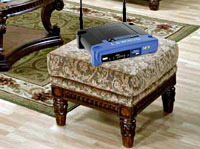 The space-age wireless house is coming ever-nearer with new figures from Strategy Analytics revealing the growth of Wi-Fi networks amongst the sofas, dining tables and four poster beds of the home.
The space-age wireless house is coming ever-nearer with new figures from Strategy Analytics revealing the growth of Wi-Fi networks amongst the sofas, dining tables and four poster beds of the home. The Americans were found to be leading the world with 8.4 percent penetration, followed by the nippy Nordic region with 7.9 percent.
The Americans were found to be leading the world with 8.4 percent penetration, followed by the nippy Nordic region with 7.9 percent. “Rich people have more electronic gadgets” shocker!
“Rich people have more electronic gadgets” shocker! Mercer added that rising ownership of laptop PCs and other portable Internet devices will soon make Wi-Fi the dominant home networking choice for most broadband subscribers.
Mercer added that rising ownership of laptop PCs and other portable Internet devices will soon make Wi-Fi the dominant home networking choice for most broadband subscribers. Broadband giants Telewest have had to bend over and feel the sharp swish of the Advertising Standards Agency’s corrective ruler on their ample rumps after their broadband radio advert was deemed ‘misleading.’
Broadband giants Telewest have had to bend over and feel the sharp swish of the Advertising Standards Agency’s corrective ruler on their ample rumps after their broadband radio advert was deemed ‘misleading.’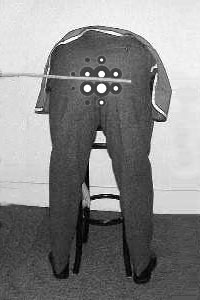 A Telewest customer – clearly already living in a Telewest area – liked the sound of the deal so much they rang up to sign on, only to find that they were clearly in the wrong sort of ‘Telewest area.’
A Telewest customer – clearly already living in a Telewest area – liked the sound of the deal so much they rang up to sign on, only to find that they were clearly in the wrong sort of ‘Telewest area.’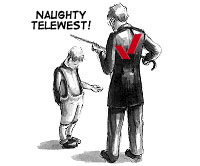 The ASA concluded, “We considered this important restriction should have been explained in the ad and that “Conditions apply” had not been adequate to cover such a significant condition to the offer. The ad breached CAP (Broadcast) Radio Advertising Standards Code section 2, rule 3.”
The ASA concluded, “We considered this important restriction should have been explained in the ad and that “Conditions apply” had not been adequate to cover such a significant condition to the offer. The ad breached CAP (Broadcast) Radio Advertising Standards Code section 2, rule 3.”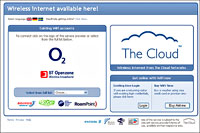 The Cloud has announced plans to roll out a new flat-fee Wi-Fi tariff in the summer, slashing the current high cost of accessing the Internet on the move.
The Cloud has announced plans to roll out a new flat-fee Wi-Fi tariff in the summer, slashing the current high cost of accessing the Internet on the move. The Cloud’s chief executive George Polk said that his company has been working their Internet-enabled socks off to “make the Wi-Fi mobility world real” (whatever that means).
The Cloud’s chief executive George Polk said that his company has been working their Internet-enabled socks off to “make the Wi-Fi mobility world real” (whatever that means).